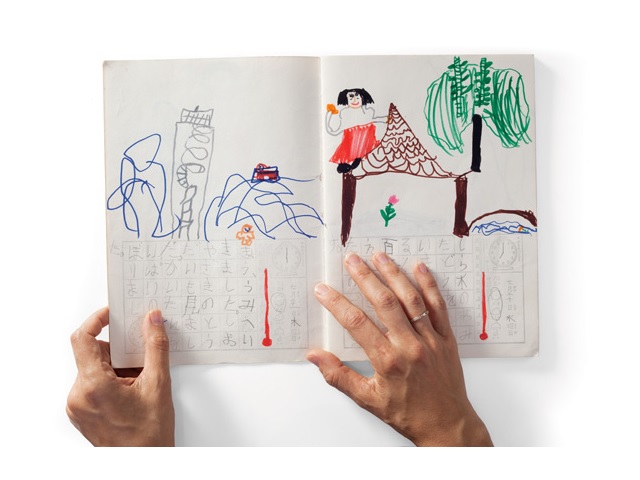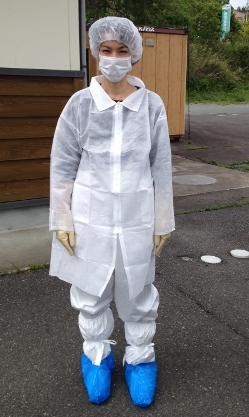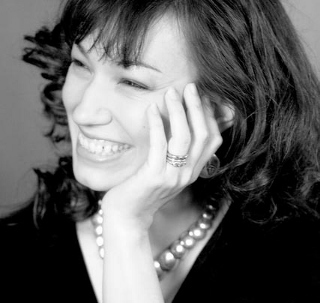The author of Picking Bones from Ash on Japanese Buddhism, tsunami survivors, and her trip into the “exclusion zone”

March 7, 2014
As a child traveling through Japan, Marie Mockett, author of the novel Picking Bones from Ash, remembers learning an important lesson about tsunamis from her mother: when the ocean starts to disappear, drop everything and run up a hill. She was reminded of that lesson three years ago, when the T?hoku earthquake and tsunami ravaged Japan on March 11, 2011. The city of Sendai, 126 miles north of her family’s Buddhist temple on the northeast coast, was hit the hardest.
On a recent four-month stay in Japan with her son, Mockett was asked to appear in a documentary for Japan’s national broadcasting company, NHK. As part of the project, she visited tsunami survivors as well as a number of places associated with quelling spirits of the dead following the disaster. She entered into the “exclusion zone” with a Buddhist priest, both of them wearing full-body anti-contamination suits and masks, to see his beautiful five hundred-year-old temple, which he and his family have had to evacuate.
In Mockett’s soon-to-be-published memoir, tentatively titled Where the Dead Pause: A Journey in Japan, she turns to the history of her family’s Buddhist temple in Japan, 25 miles from the Fukushima Daiichi nuclear power reactor, and the experience of coping with death and disaster.
Mockett, whose parents met while studying music in Vienna, Austria, was born and raised in Carmel, CA, speaking Japanese with her mother and German with both parents. She’s grown to love traveling and learning languages, of course, but she also has a passion for dance. She joins us this week for Studio Visit.
What’s on your nightstand now?
Lots of books on Japanese language, culture and religion. And another pile of books on the Japanese children’s superhero Anpanman. I have very little spare time, so I have to keep my reading focused. Except for my recipe reading. I read lots of Japanese recipes to improve my language skills.
What superpower would you most like to possess?
Well, it used to be flight (at super sonic speed, with the capacity to stay awake for transatlantic or transpacific flights). Selfishly, I just wanted to see the world. Selfishly, I still want to see the world. But if I had to pick one superpower, I now find myself leaning toward something helpful. After spending so much time in Japan, and seeing what a terrible impact the earthquake, tsunami, and nuclear power disaster have had on so many people, I would very much like to find a way to relieve suffering. But such a thing is difficult. Where do you start? Do you stop earthquakes? Do you give people an unlimited energy supply? Do you make them live forever, impervious to illness or injury?
See what I did? I took your fun question and made it depressing and overly complicated.

What role does place have in your writing?
I have never really thought about place. I think of myself as grappling with ideas, with trying to show what it is to be human across cultures. But if you look at my writing, you’ll see that I spend a lot of time in Japan and the west coast, with a bit of Europe thrown in for good measure.
I am a big lover of dance, and am very curious about physical vocabularies across cultures. When my husband and I fly to Scotland (where he is from), we play a game in the airport. We like to try to pick out which white people are Scottish, and which are American. You can tell from their body language. Most Asians have at one point or another tried to pick out Koreans, Japanese, and Chinese based on little differences in behavior. My body language changes significantly in Japan—and again when I leave New York and go to California. I’m always curious how environment shapes and changes people. But I tend to think of people—and concepts—first, and then think about place.
What songs are on your ipod now?
There are no songs on my iPod. I have a million photos and games for my son to play on the 14 hour flight to Tokyo. But no songs. My favorite music is classical and jazz, and I go hear live music when I can.
What is your writing process?
Desperate? Does that count? Currently I’m on a fellowship in Japan, which means my brain is maxed out doing research and speaking another language. I also brought my son with me, and he has soaked up the Japanese language, but needs reassurance that we will go home one day. No one wants to hear about how a writer is grappling writing with parenthood. But I am grappling with writing and parenthood.
What are you working on right now?
A memoir about my family in Japan, who own and run a temple 25 miles from the Fukushima Daiichi nuclear power reactor. They are Zen priests and I have spent the last few months learning a great deal about Japanese Buddhism in its many forms, visiting tsunami survivors, speaking with priests who have been turned out of the nuclear zone and learning how to appease ghosts and demons. The book is turning into a broader look at grief.
What’s your guilty pleasure?
I think guilt is over-rated and one of the worst aspects of Western culture.
What did you want to be when you grew up?
Dancer, followed by a writer. I’m very stubborn.




